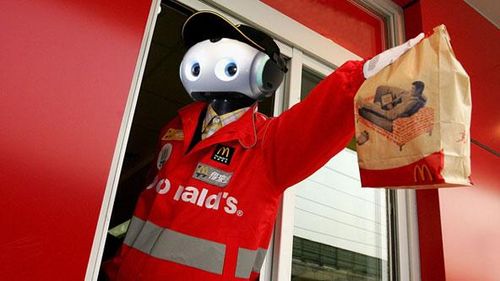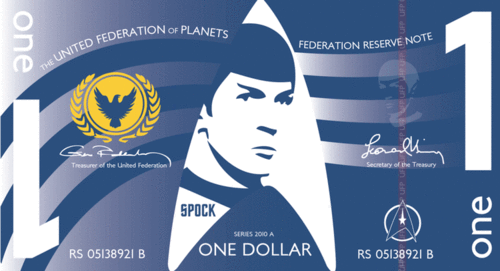
I was listening to a futurist talking about our planet, its
growth, its overpopulation, the challenge of feeding the planet, sustainability
and more, and in the middle of all of this he said that the future would have
no money.
No money.
Zero.
Nada.
Nowt.
A future without money?
You must be joking.
I mean I often talk about a future with no cash, but that’s
different.
My standard view of the world is a future where all payments
are made wirelessly through the ether. A
future where debits and credits are taken seamlessly through the day, and you
don’t think about it happening. It just happens.
That future is pretty much here already, as demonstrated by PayPal Checkin:
and Square Wallet:
But he didn’t mean location based payments through the
air. He meant a future with no money at
all.
This is based upon a future where the planet has unlimited
resources thanks to 3D printing and automated production of goods, services and
produce. Cows and sheep are no longer
farmed but produced in laboratories as meat, as are most food produce.
The result is that no-one needs or wants for anything. Even if they did, the world would fail as
most humans cannot earn money because work is automated.
The robots have taken over and you cannot even get a McJob
in the future as McDonalds is fully automated.

Image from The Fiscal Times
If everyone is unemployed, how do you keep order? How do you avoid anarchy?
Maybe we need to look towards Star Trek for the answer to
this question.
Star Trek invented so many future themes – the mobile telephone, the microwave, the plasma TV – that they
might have seen a future for money:
“Money is a
terrible thing.” Gene Roddenberry, Creator of Star Trek
“Money most emphatically did not exist in the Federation,
nor did 'credits' and that was that.” Ronald Dowl Moore, Writer and Producer, Star Trek
“We have eliminated hunger, want, the need for
possessions.” Jean Luc Picard, Captain, USS Enterprise
Could it be true?
Could the future not just be cashless, but moneyless?
As production becomes
increasingly efficient and requires ever less labor, civilization is faced with
a horrible dilemma—abundance. Without scarcity,
there can be no market. Money deprived
of a market is a goldfish flopping about after its bowl has been shattered.
Giovanni Dannato, the Heretic’s Way, 2011
We hear talks about
access/resource based economies, where we simply declare all of Earth's
resources as the common heritage of mankind and make goods and services
available to all without the use of money, credits, barter or any other system
of debt or servitude, through technological abundance.
TED Conversations Is
There a Future for Money? 2012
The market is showing
us that intellectual capital is far more important than money. This is a major
change in the way the world works.
Walter Wriston, former CEO of Citibank, 1997
Money is a social
construct, not just a technological one. For e-cash to be money, everyone has
to agree that it's money.
Microsoft Research, 2002
The demise of the
paper money system will offer great opportunities for a new breed of money
entrepreneurs. In that role, I could see gold storage companies, payment
technology companies, Bitcoin service providers and asset management companies.
If some of these join forces, the opportunities should be great.
Detlev Schupeter, 2012
“There is no reason
products and services could not be swapped directly by consumers and producers
through a system of direct exchange – essentially a massive barter economy. All
it requires is some commonly used unit of account and adequate computing power
to make sure all transactions could be settled immediately. People would pay
each other electronically, without the payment being routed through anything
that we would currently recognize as a bank. Central banks in their present
form would no longer exist – nor would money.”
Mervyn King, former Governor of the Bank of England, 1999
We’ll always need
words to communicate and we’ll always need numbers to communicate value – we’ll
always need prices, and once you’ve got prices that are set in the live
experiments of the market, you’ve got money.
Ali Mattu, Brain Knows Better blog, 2013
Or maybe the future still has cash after all of that.

Image via StarTrekFans
Chris M Skinner
Chris Skinner is best known as an independent commentator on the financial markets through his blog, TheFinanser.com, as author of the bestselling book Digital Bank, and Chair of the European networking forum the Financial Services Club. He has been voted one of the most influential people in banking by The Financial Brand (as well as one of the best blogs), a FinTech Titan (Next Bank), one of the Fintech Leaders you need to follow (City AM, Deluxe and Jax Finance), as well as one of the Top 40 most influential people in financial technology by the Wall Street Journal's Financial News. To learn more click here...

